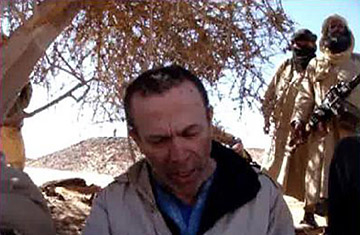
Image released by al-Qaeda in the Islamic Maghreb with a written statement and photos showing a man identified as being British.
In the three years since allying itself with Osama bin Laden, North Africa's al-Qaeda in Islamic Maghreb (AQIM) militant group has worked hard to align its terror activities and communications with those of its radical parent organization. Topping the list of the techniques AQIM has borrowed from its brothers in the Middle East and South Asia is kidnapping Westerners to net big-money ransoms — or carefully choreographing their executions to shock the world. As the fates of several hostages hang in the balance in Mali and Mauritania, Western governments are grappling with how to deal with the growing problem: should they pony up hefty ransoms time and again to save their citizens, or stand by the time-worn policy of refusing to negotiate with hostage takers?
Of course, kidnapping foreigners has long been a staple of militant activities in war zones like Iraq or Afghanistan and, at times, even in supposedly more secure settings like Pakistan and Yemen. But apart from a one-off abduction of 32 Europeans trekking in the Algerian desert in 2003, North African militants never showed much of an interest in kidnapping until they linked up with al-Qaeda in 2007. Since then, it's become a veritable habit.
Hard figures are hard to come by, but analysts believe some 15 to 30 Westerners have been abducted by AQIM in North Africa in the last three years. While the group has unleashed many of its most violent terrorist acts (bombings and shootings) in cities like Algiers, its kidnappings have all taken place in the vast Sahel region stretching across Mauritania, Morocco, Algeria, Mali, Niger, Libya and Tunisia. According to experts, the number of insurgents roaming the desert area in four-wheel vehicles has increased from a few score to perhaps 200 in the past two years, including both hard-core members and supporters who periodically participate in missions.
Security experts believe that AQIM's shift in tactics began in earnest with the December 2007 killing of four French tourists in Mauritania in what officials believe was a botched kidnapping. Successful abductions of Westerners then followed in Tunisia, Nigeria, Algeria and, most recently, in Mali, where French aid worker Pierre Camatte was snatched from his hotel on Nov. 25, and again in Mauritania, where three Spanish volunteers and an Italian couple were kidnapped on Nov. 29 and Dec. 19, respectively.
AQIM had set a Jan. 31 deadline for Mali to release four of the group's imprisoned members in exchange for Camatte's freedom, but that date came and went with no action from the government, prompting French Foreign Minister Bernard Kouchner to make an urgent visit to the country on Tuesday to try to resolve the situation. Spain's El Mundo newspaper reported last month that AQIM wanted $7 million and the release of several other militants in exchange for freeing the three Spanish hostages, but Madrid has ruled out paying a ransom. According to an audiotape released by the group, the Italians were nabbed in retaliation for "crimes committed by the Italian government in Afghanistan and Iraq," but no ransom demand has yet been made.
Although obtaining money to fund its attacks against North African governments remains AQIM's main reason for kidnapping foreigners, analysts believe another motivation is terrorizing the West. A French foreign intelligence official tells TIME that militants executed a British hostage last May, for example, simply to horrify the world after efforts to secure a ransom reportedly failed. The man, Edwin Dyer, was abducted while traveling in Niger in January 2009, and in exchange for his freedom, AQIM demanded $14 million and the release of a radical cleric being held in a British prison. When Britain balked, Dyer was executed less than 24 hours later. Some analysts now say that the demands could have been a ruse and that AQIM had been planning to kill Dyer all along.
"There's no way any Western government is going to pay that kind of money, or hand over a detainee of Abu Qatada's importance as a surrender to blackmail — quite clearly non-starters," says the French intelligence official, who requested anonymity while discussing matters related to terrorism. "Their intent was to assassinate Dyer from the start, and the entire bogus demand and deadline process was designed to prolong public anguish over Dyer, and maximize its horror when he was killed."
AQIM has also carefully constructed religious and ideological arguments for its actions so local Muslim populations see kidnapping as part of the group's holy work, analysts say. "It's essential that jihadists believe they can credibly justify horrible criminal acts as righteous before they undertake them to both themselves, the victims and the world," says another French counter-terrorism official. "That has allowed AQIM to embrace something it had regarded as the lowly work of vulgar crooks and Mafia types before."
But despite the gruesome executions that sometimes happen when ransoms aren't paid, African officials have urged Western governments not to encourage hostage taking by rewarding it. Last September, Algerian President Abellaziz Bouteflika asked the United Nations to adopt an international ban on paying ransoms, which he called "the biggest source of terror financing today." Still, with the clock ticking for the hostages now in AQIM's hands, the decision for Western leaders grows more difficult by the day.
